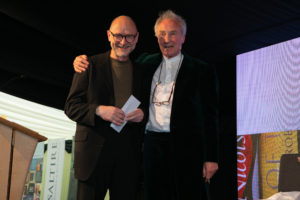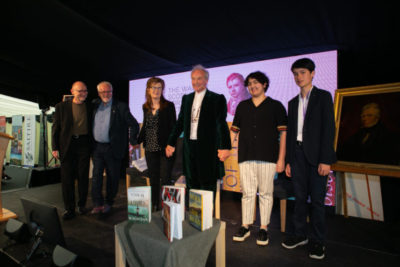Prizes celebrated in live events at Borders Book Festival
1st September, 2022
The Walter Scott and Young Walter Scott Prizes were back in force at the Borders Book Festival this June, with Melrose’s Harmony Garden buzzing with the bookish excitement of being back together in person for the first time since 2019.The announcement of the Walter Scott Prize for Historical Fiction is one of the key events of the Borders Book Festival, and this year’s shortlist of four titles – Andrew Greig’s Rose Nicolson, James Robertson’s News of the Dead, Amanda Smyth’s Fortune and Colm Tóibín’s The Magician, promised an evening in the company of some of the most illustrious proponents of the genre.
The authors gave animated readings from their work, with Christine Dwyer Hickey expertly standing in for Colm Tóibín, and actor and prize reader Bridget McCann performing Amanda Smyth’s Fortune, as those authors were unable to attend.
James Robertson was then announced as the clearly delighted winner by the Duke of Buccleuch, and received his cheque and framed photograph of a Borders landscape – ‘a little piece of the Borders for you to take home’.

James Robertson and the Duke of Buccleuch
The prize ceremony also saw 2020 winner Christine Dwyer Hickey presented with her prize, in person, for The Narrow Land, the original ceremony cancelled by Covid-19 restrictions.
The 11th Young Walter Scott Prize was also awarded to two young writers: Oliver Dhir from Glasgow and Leo Wilson from Oxfordshire were thrilled to be presented with a travel grant and a printed anthology of their short stories, Oliver’s A Lost Generation and Leo’s For the Love of the Sun.
The next day, Saturday 18th June, saw Walter Scott Prize winners Christine Dywer Hickey and James Robertson alongside acclaimed shortlisted author Andrew Greig in a fascinating panel event chaired by Katie Grant, chair of the prize judges.
Both Christine and Andrew revealed that they knew almost nothing about their chosen subjects – artist Edward Hopper’s marriage and 16th century Reformation Scotland, respectively – when the ideas for their books first took hold. For Christine, a long recuperation following cancer surgery included nights of insomnia and days of rest when, half-sleeping, she lay listening to a documentary about Hopper – creator of haunting canvasses full of light and space.
Andrew admitted that he’d had to change his own ideas about the historical novel completely in order to write Rose Nicolson, once viewing the genre as ‘cheap’, but now as an almost postmodern invention, because of its central conflict: things “historical” are true, and “fiction” is made-up. The achievement of great historical fiction, he added, is that it allows readers right inside the heads of people from history.
And what of historical fiction’s current renaissance, the authors were asked? In today’s anxiety-ridden times, readers want reassurance that humanity has already survived worse things than current-day crises, agreed James and Christine, James adding that it’s also comforting that humans then were no different from us, that they had their own weaknesses, fashions and fads.
One common misconception about people from the past, added Andrew, is that they were “a bit stupid,” and nothing like as sophisticated as we are. Historical fiction, he said, helps readers grasp that “everything that happened in the past happened in its ‘now.’ Furniture changes,” he said – “humans don’t.”
Audiences were left enlightened, inspired, and transported by the two events, which celebrated both the very best currently published historical fiction, and the historical novelists of the future.
The Walter Scott Prize Ceremony can be enjoyed again here, and you can watch interviews with all this year’s shortlisted authors and YWSP winners here.

